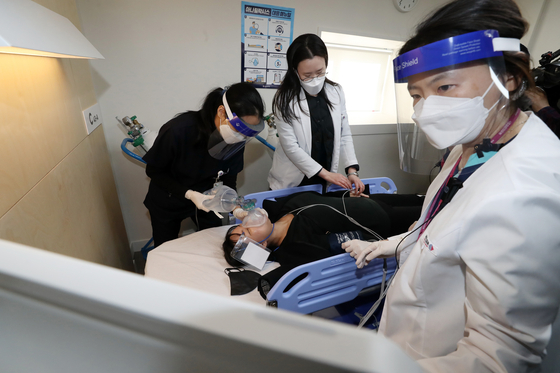“I can’t breathe.”
When a woman, who was looking for an abnormal reaction in the observation room, said this, an emergency call of “Quick Response Team, Rapid Response Team” rang from the speaker. The patient was transferred to the first aid area while in a wheelchair. Four doctors wearing face shields checked blood pressure while supplying oxygen with an oxygen respirator. “I put epinephrine (cardiac medicine). Please call the emergency room for anaphylaxis (acute severe allergic reaction).” It took about 5 minutes for the patient to get on a stretcher and get into the ambulance.

In a simulated training session for COVID-19 vaccination held at the Central Vaccination Center of the National Medical Center in Jung-gu, Seoul on the 9th, medical staff are providing first aid to participants who showed abnormal symptoms after vaccination. News 1
The first new coronavirus infectious disease (Corona 19) vaccination in Korea will begin on the 26th, and if an adverse reaction occurs after vaccination, this process is expected to go through. At 2 pm on the 9th, at the Central Vaccination Center of the National Medical Center in Jung-gu, Seoul, a vaccination simulation training was held under the assumption of such an emergency situation. From the end of this month, medical staff in response to Corona 19, such as the central medical center medical staff, and infectious disease hospitals in the metropolitan area, will be inoculated sequentially.

On the afternoon of the 9th, medical staff are vaccinating participants in the Corona 19 vaccination simulation training held at the National Medical Center’s Comprehensive Cancer Vaccination Center in Jung-gu, Seoul. Photo Sharing Foundation
In the mock training that day, 50 employees of the Central Medical Center and the vaccination centers that will be in three areas in the future participated as vaccination targets. At 2 pm, the subjects who had been informed in advance had their identity checked and entered each wearing a necklace. After measuring the body temperature with a camera in the registration building, the hands were disinfected and the information was received. Inoculations who submitted preliminary vouchers were then moved to the vaccination building and waited. When their number was displayed, each of them went to Yejin to check if there was any uncomfortable place. If there was no problem, I got the vaccine, but the vaccination took about 3 minutes.
After vaccination, I moved to the observation room next door. Subjects seated in 34 chairs separated by 1 m interval waited for 15 to 30 minutes to observe adverse reactions. The doctor in the observation room explained, “If you have fainting or dizziness after vaccination, it will be stabilized if you lay it down for 2 to 3 minutes.”
On this day, the vaccine was conducted under the assumption of Pfizer. Pfizer vaccine is the most difficult because it must be stored and distributed at very low temperatures. It is said to be stored in a freezer at -60 to 80 degrees Celsius, then moved to a refrigerator the day before inoculation and defrosted. In the simulation training on this day, two nurses and others sat on a sterile clean bench and gave a vial (bottle) containing six people one at a time and delivered it to the inoculation area.
Myung-don Oh, head of the Central Vaccination Center (Professor of Infectious Medicine, Seoul National University Hospital), said, “It is most difficult to have the Pfizer vaccine melted once and then frozen again. It is very important to do it.”
In the future, the vaccination center is planning to have 600 vaccinations per day. Taking this into account, 50 people received training for 30 minutes from arrival, preparing a preliminary form, pre-examination, vaccination, and observation after vaccination. The vaccination starts at 2 pm and ends at 2:47 pm. It took about 17 minutes longer than the goal.
Center Director Oh Myung-don said, “It was a little delayed, but there are some parts related to filming, and I think it’s a little late because it comes from outside.” He said, “The government said that 250 (inoculation) centers were run, so if they were all turned around, it would fit 150,000 people a day.”

On the afternoon of the 9th, medical staff are transferring the vaccine in a simulated training for COVID-19 vaccination held at the National Medical Center’s Comprehensive Cancer Vaccination Center in Jung-gu, Seoul. Photo Sharing Foundation
Mr. Park, 41, who participated in the mock training that day, said, “There are concerns that the movement lines may overlap depending on the stage.” In this regard, Center Director Oh Myung-don said, “There are areas where some corridors are narrow or overlapping lines of traffic because it was used for other purposes. I think that the vaccination center will be designed with important considerations such as the arrangement of the flow path.”
Center Director Oh also said, “It is an important process to carefully look at the instructions until the order comes in the waiting room, but it requires careful consideration.” “I was interested in seeing where the bottleneck would be. It is important to secure space. When the waiting room is full, it is necessary to prepare additional space in advance.”
On that day, Center Director Oh made a brief comment after receiving a question about the controversial AstraZeneca vaccine vaccination for the elderly.
“I will only talk about safety,” he said. “At the second dose, AstraZeneca has fewer side effects than other vaccines. There are 30,000 clinical trials in the United States, Chile and Peru, and there are no signs of danger for side effects.” “The effect (result) is supposed to come out around March 23, last year, over 26,000 people were vaccinated, and 25% of those over 65 belonged to, but no abnormal signal was detected.” And emphasized again.
Reporter Hwang Soo-yeon [email protected]
